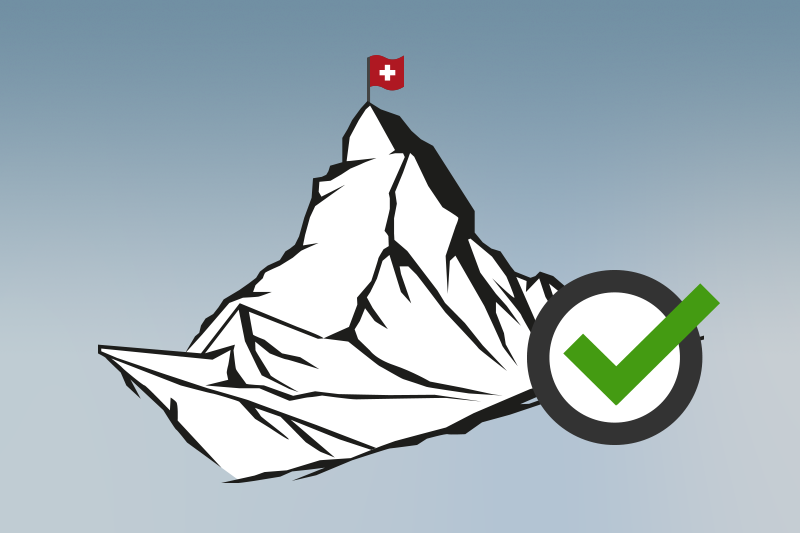Are most Swiss residents rich?

A reader wondered if it was true that some people in Switzerland don’t earn enough to afford basic necessities like compulsory health insurance. Another simply asked: Are most Swiss people rich?
Switzerland’s reputation as a rich country is unshakeable. For several consecutive years the Swiss have been found to be richer than anyone else in the world in terms of mean wealth per adult. And just in recent weeks two separate studies have shown the country finishing in the top ten for the highest number of dollar millionaires.
But being rich on paper is only part of the story. In this instalment of our ongoing series verifying claims about Switzerland sent in by readers, swissinfo.ch lifts the veil to find a more mundane reality: when it comes to wealth, it’s all relative.
Money, money, money
Private jets, lakeside villas, ski holidays in glitzy resorts. In the collective imagination Switzerland and the super-rich go hand in hand. Credit Suisse estimatesExternal link the country is home to 2,650 individuals who own at least $50 million, falling into the so-called ultra-high-net-worth bracket. As for the millionaire club, various estimates put the number at between 384,000 and 500,000 households (for a population of 8.4 million).
No question, the super-rich have cash to spare. But just how much money it takes for the rest of the population to be considered wealthy is unclear.
The Federal Statistical Office says it does not have an objective definition of who is “rich” in Switzerland. Nor does the Swiss bank UBS, which bills itself as the world’s largest wealth manager.
In the absence of a minimum dollar figure to set the rich apart, wealth distribution data can provide some indication of where most inhabitants fall. And it’s not into the billionaire or millionaire category. Just over half have assets between $100,000 and $1 million.
There are in fact fewer millionaires and billionaires than there are people with less than $10,000 to their name. Another sobering factExternal link: the top 20% earn almost five times more than the bottom 20%, so the wealth gap is as significant in Switzerland as it is in other parts of the developed world.
The Statistical Office defines the majority of the population as neither rich nor poor: 57.5% fall under the category of middle incomeExternal link, which it defines as households with a gross income of between 70% and 150% of the median income. Those who earn anything above that are considered “high income”, says the stats office, still refraining from using the term “rich”.
Rich to some
Looking at these figures, it may be tempting to think the Swiss middle class is wealthy indeed. To boot, inhabitants of the Alpine nation have the second highest median disposable incomeExternal link (in purchasing power standard) in Europe, after Luxembourg.
But the concept of wealth depends a lot on where you live. And living in Switzerland, otherwise known as the “high-price island”, can drain bank accounts pretty quickly. It is the most expensive place in Europe for food, and among the most expensive countries for clothing, hotels and restaurants.
The median monthly gross salary, which stood at CHF6,502 ($6,597) in 2016, is just enough to cover the high cost of living. After rent, taxes and social security contributions, plus spending on goods and services, the average household has about 15% of its gross income left for savings, the statistical office reportsExternal link.
Those with a revenue totalling less than CHF5,000 gross can’t afford to put money aside. Many of them, especially retirees, are even forced to dip into their savings to cover expenses.
The poverty line
If the Statistical Office doesn’t have a definition for the “rich”, it has one for the poor. And this category of households (earning less than CHF3,990 per month for a household of two adults and two children) has seen its ranks grow steadily since 2014, rising by nearly 10% from 2016 to 2017. Poverty affects 8.2% of the population.
A further 15% are at risk of povertyExternal link. Single-parent families, those with no post-compulsory education and those who are out of work are among the most likely to be living below the poverty line.
Although getting a job is considered a way out of poverty, among the gainfully employed, some 4.3% are considered working poor. One in ten jobs in Switzerland is considered low-paid and roughly 12% of Swiss workers hold such jobs, many of them women and foreigners.
Drain on the wallet
As for health insurance, it’s a mandatory expense for all inhabitants, no matter how rich or poor they are. And it doesn’t come cheap. Premiums go up each year, which means they account for an ever-larger piece of household income (6.2% in 2016), according to the statistical office.
Our reader was right to single it out: About a quarter of the populationExternal link needs financial help to pay their premiums, which is provided by the cantons with some federal funding. Families, and in particular single-parent households, depend on this type of support.
The verdict
Switzerland may have more than its share of billionaires, but more than half of the population falls in the middle-income category as defined by the authorities. On paper the average Swiss owns more money than most everyone else in the world, yet earns just enough to afford the high cost of living on the notorious “high-price island”.
Rich or not, what the Swiss can say for sure is that they enjoy one of the highest standards of living in Europe External linkand are by their own account more satisfied than most with their livesExternal link – no opulent villa or super-sized yacht necessary.
This article is part of an ongoing series of fact checks driven by our readers, who have been writing in with suggestions of claims about Switzerland we should verify. If you’ve heard something about the country and its inhabitants that we should put under the microscope, contact us by clicking on the link below.

More
Heard something about Switzerland we should fact check?

In compliance with the JTI standards
More: SWI swissinfo.ch certified by the Journalism Trust Initiative












You can find an overview of ongoing debates with our journalists here . Please join us!
If you want to start a conversation about a topic raised in this article or want to report factual errors, email us at english@swissinfo.ch.